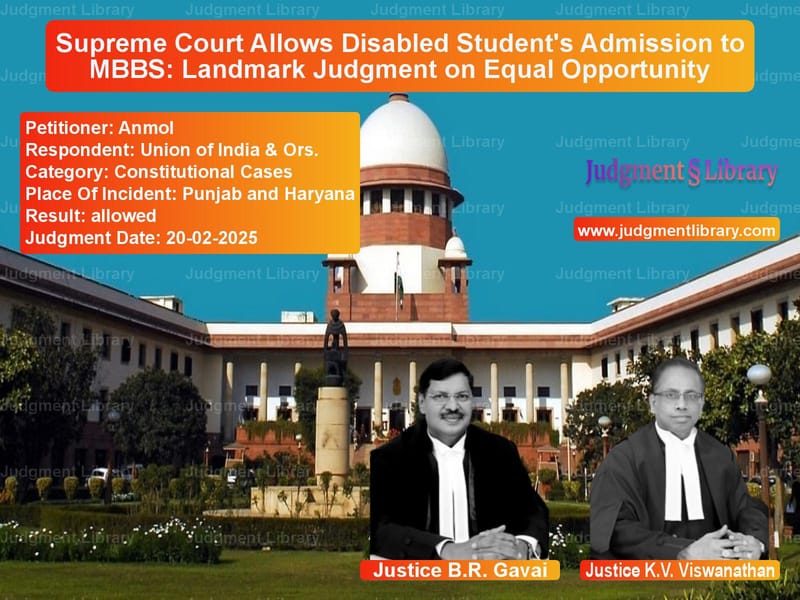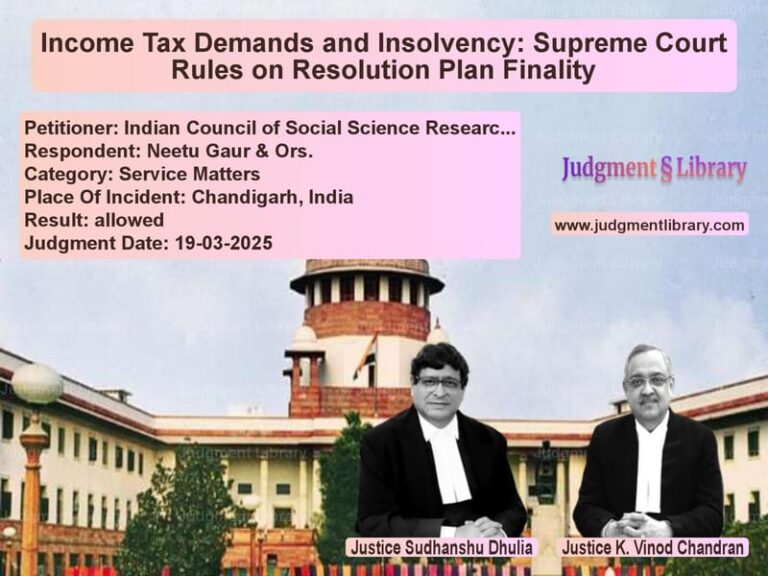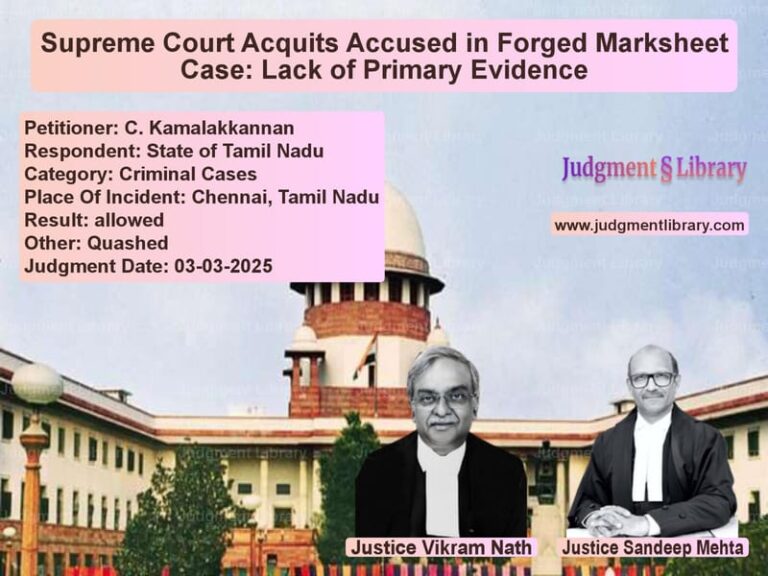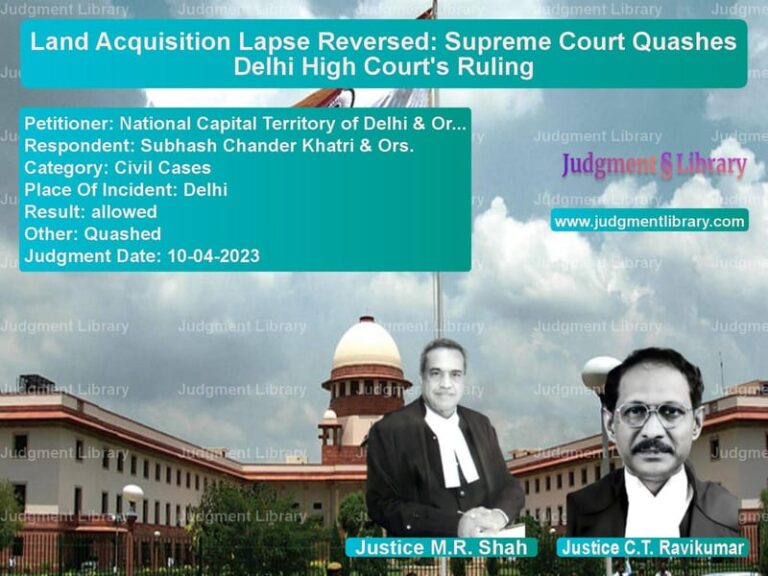Supreme Court Allows Disabled Student’s Admission to MBBS: Landmark Judgment on Equal Opportunity
The Supreme Court of India recently delivered a landmark ruling in the case of Anmol v. Union of India & Ors., concerning the rights of persons with disabilities (PwD) in accessing higher education. The appellant, Anmol, a student with a locomotor disability of 58%, was denied admission to the MBBS course despite clearing the NEET-UG 2024 exam and meeting the cut-off for the OBC-PwD category. The case raised critical questions about the application of disability guidelines under the National Medical Commission (NMC) and the right to education for disabled candidates.
Background of the Case
The appellant, Anmol, who has a locomotor disability of 50% along with speech and language impairment of 20%, had excelled in his school academics and performed well in the NEET-UG 2024 examination. His rank in the PwD category was 2462, significantly higher than the required cut-off for OBC-PwD candidates. He applied for admission under the reserved quota for persons with disabilities but was declared ineligible by the Disability Assessment Board at the Government Medical College, Chandigarh, without proper reasoning or functional assessment.
Upon rejection, Anmol approached the Punjab and Haryana High Court seeking a writ of certiorari to quash the disability certificate that deemed him unfit for MBBS education. The High Court dismissed his petition, ruling that courts cannot interfere with expert medical assessments. Aggrieved, he appealed to the Supreme Court.
Petitioner’s Arguments
The appellant, represented by his legal team, put forth the following arguments:
- The Disability Assessment Board failed to conduct a proper functional assessment and merely relied on quantified disability percentages.
- According to the Rights of Persons with Disabilities (RPwD) Act, 2016, educational institutions must provide reasonable accommodations to disabled students instead of outright rejecting them.
- The NMC guidelines, particularly the clause stating “both hands intact with intact sensations,” discriminate against disabled individuals and propagate ableism.
- Recent Supreme Court judgments, including Omkar Ramchandra Gond v. Union of India, had already directed the revision of such discriminatory guidelines.
Respondents’ Arguments
The respondents, including the Union of India and the NMC, countered the petitioner’s claims with the following arguments:
- The Disability Assessment Board followed existing NMC regulations, which mandate specific physical abilities for medical students.
- The rejection was not arbitrary but based on standardized eligibility criteria for MBBS candidates.
- The petitioner’s disability was above the prescribed threshold, making him ineligible under the current guidelines.
- There was no provision for modifying the existing framework of eligibility criteria for PwD candidates.
Supreme Court’s Observations
The Supreme Court, led by Justices B.R. Gavai and K.V. Viswanathan, critically examined the medical reports and legal precedents. The Court observed:
- The rejection by the Disability Assessment Board lacked a functional assessment, which was mandated by prior judicial rulings.
- The five-member medical board at AIIMS, while deeming Anmol ineligible, itself admitted that the NMC guidelines needed revision.
- Dr. Satendra Singh, a disability expert and member of the board, provided an independent report stating that Anmol could successfully complete the MBBS course with reasonable accommodations.
- The principle of reasonable accommodation under the RPwD Act requires educational institutions to make necessary modifications instead of outright rejection.
Key Verbal Arguments of the Court
“The current NMC Guidelines perhaps need revision, and with respect to the current Guidelines, this Medical Board is not able to declare the candidate FIT to join MBBS course.”
“We are not prepared to uphold the theory of ableism which these guidelines propagate. The ‘both hands intact’ requirement lacks legal sanctity and violates fundamental rights.”
“A functional assessment must determine whether the candidate, with assistive technologies and accommodations, can pursue medical education—not blanket disqualification based on outdated norms.”
Final Judgment
The Supreme Court ruled in favor of the appellant, stating:
- Anmol shall be admitted to the Government Medical College, Sirohi, Rajasthan under the OBC-PwD quota.
- The NMC must revise its guidelines in line with prior Supreme Court judgments and the RPwD Act.
- All Disability Assessment Boards must conduct functional assessments instead of relying on rigid disability quantifications.
The Court also directed the National Medical Commission to submit an affidavit detailing progress on guideline revisions before the next hearing date.
Impact of the Judgment
This ruling is a significant victory for disability rights and equal opportunity in medical education. It sets a precedent that functional ability, rather than arbitrary physical criteria, should determine eligibility for professional courses. The judgment reinforces the constitutional mandate of inclusive education and prevents discrimination against disabled students in competitive fields like medicine.
Petitioner Name: Anmol.Respondent Name: Union of India & Ors..Judgment By: Justice B.R. Gavai, Justice K.V. Viswanathan.Place Of Incident: Punjab and Haryana.Judgment Date: 20-02-2025.
Don’t miss out on the full details! Download the complete judgment in PDF format below and gain valuable insights instantly!
Download Judgment: anmol-vs-union-of-india-&-ors-supreme-court-of-india-judgment-dated-20-02-2025.pdf
Directly Download Judgment: Directly download this Judgment
See all petitions in Fundamental Rights
See all petitions in Public Interest Litigation
See all petitions in Constitution Interpretation
See all petitions in Judgment by B R Gavai
See all petitions in Judgment by K.V. Viswanathan
See all petitions in allowed
See all petitions in supreme court of India judgments February 2025
See all petitions in 2025 judgments
See all posts in Constitutional Cases Category
See all allowed petitions in Constitutional Cases Category
See all Dismissed petitions in Constitutional Cases Category
See all partially allowed petitions in Constitutional Cases Category







